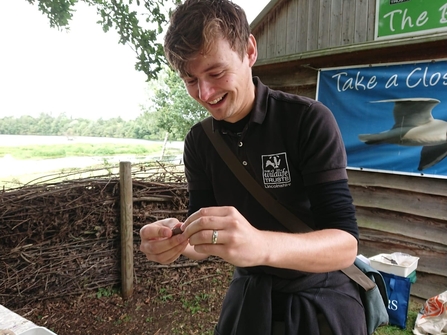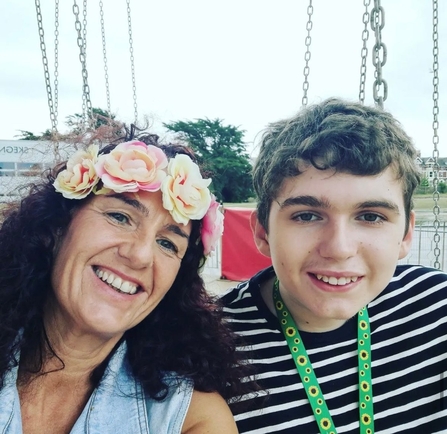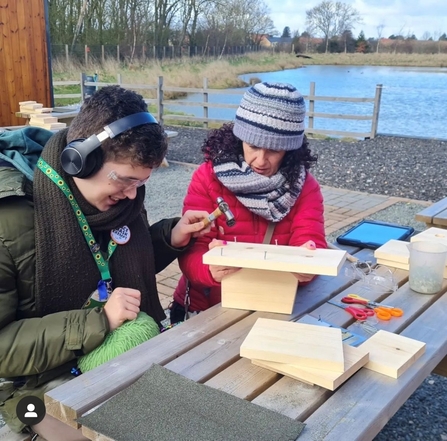“With just a little more acceptance, understanding and a few simple adjustments, more autistic people would be able to enter the workforce and put their amazing talents to use.”
World Autism Acceptance Week takes place annually from 28 March to 3 April and this year shifts the focus from awareness to acceptance, hoping to change the narrative of the week.
Instead of raising awareness, the aim is to increase acceptance and understanding, working towards a world that accepts autistic people for who they are, ensuring they get the support they need. Being autistic is a fundamental part of who someone is and by creating a world that is accepting and works for them, creates equality, appreciation and celebration.
Just 22% of autistic people are currently in employment
This shocking statistic makes it clear as a society we can do better. With this in mind we wanted to find out from a member of our own team at Lincolnshire Wildlife Trust what it means to be autistic and what acceptance within the world and workplace looks like to them.
Meet Sam Reast our Education & Community Officer at Whisby Nature Park

Sam Reast - Education & Community Officer at Whisby Education Centre.
Each autistic person is as different from each other as anyone else, as are the ways in which they interact with the world and vice versa.
Tell us about yourself...
So, my name is Sam Reast, I’m an Education Officer with Lincolnshire Wildlife Trust and, full disclaimer, I’m autistic. This doesn’t mean that I know completely what I’m talking about when I talk about autism or what it means to be neurodivergent in a world so heavily built-in favour of the neurotypical. Each autistic person is as different from each other as anyone else, as are the ways in which they interact with the world and vice versa.
Like many other autistic people my childhood, particularly in the academic sense, was an incredibly difficult time. Both before and after my diagnosis, I found the forceful academic system too restricting, the behaviour of some staff and fellow students was unpredictable and often disruptive and I was repeatedly reminded that I was different, didn’t really fit in and (due to my lack of academic excellence) wouldn’t amount to much in the adult world, even though I was a “nice young man”. It wasn’t until I fumbled my way into college and then university (despite being told I wouldn’t get there) that the academic support really became effective. It’s really no wonder that, as of statistics collected in 2020 by Office for National Statistics, only 22% of autistic adults are in paid employment.
Now, I’ve been incredibly blessed with relentlessly supportive parents, dedicated and caring teachers and understanding and accommodating employers and colleagues. But with statistics like that, it’s no wonder that autistic people wouldn’t want to and are advised against declaring their autism before securing employment. I have seen how failures in the mainstream academic system can affect the long-term aspirations, goals and dreams of autistic people and I have also seen how prejudices and ignorance have failed job-seeking autistic people, despite legal measures supposed to protect them.
The Natural World and Autism.
I have noticed a pattern emerging through my work with Lincolnshire Wildlife Trust and in the Scouting movement; the wildlife, environmental and outdoor industries seem to draw in a large proportion of autistic people. After all, some estimates place autistic people only counting around 1% of the world human population and some of the groups I run and help at statistically hit way above average in that regard. Why might that be?
I have a theory as to why this might occur and it’s to do with the separation of the “Natural World” and the “Human World”. The human world. Built by our societies, has developed into a very fast paced, high sensory traffic, forceful and relatively unforgiving environment. It tries to force people through the same human shaped metaphorical hole and, while that may work for the masses it supports, it highlights, labels and breaks down the rest of us in an attempt to make us fit. If you can’t, you’re a failure. The natural world, in contrast, isn’t as loud, chaotic or aggressive. It’s more accepting of how people are. It doesn’t deceive on a whim, it doesn’t force you to change who you are, it just IS. It generally follows the same rules it has done for thousands and millions of years. Sure, it can change, and it can be sometimes dangerous, but it follows its own steady and somewhat predictable pattern. I like to think, on some level, autistic people like myself are more in tune with that old, primordial world than the one humans have built for themselves. Maybe that’s why we tend to gravitate toward these areas of employment and fun.
The human world, built by our societies, has developed into a very fast paced, high sensory traffic, forceful and relatively unforgiving environment. It tries to force people through the same human shaped metaphorical hole and, while that may work for the masses it supports, it highlights, labels and breaks down the rest of us in an attempt to make us fit. If you can’t, you’re a failure. The natural world, in contrast, isn’t as loud, chaotic or aggressive. It’s more accepting of how people are. It doesn’t deceive on a whim, it doesn’t force you to change who you are, it just IS.Lincolnshire Wildlife Trust
How do you find the work environment?
For myself, I have found an employment situation that is structured enough to give me a plan to follow, but the freedom to work out my own (sometimes “very Sam”) way of achieving the goal. I am an education officer who regularly works with groups of sometimes more than 30 children and/or adults at a time, multiple days a week; and yet I struggle to deal with large groups of people. I have my coping mechanisms and fortunately for me, Lincolnshire Wildlife Trust supports me in employing them to carry out my work effectively. If left unchecked, the sensory input (a lot of noise, smell, sight and touch input traffic in one go) can get too much and can lead to headaches, panic or in rare unfortunate occasions, CODE GREEN (where my fight or flight system kicks in). So, whether it’s listening to quiet music in the office or wearing shaded lenses, I can control or limit the sensory traffic input and therefore my stress levels. This means I can continue to do my job to the best of my ability like any neurotypical person can. But for the most part the nature, not people, orientated parts of my job require very little in the ways of stress management. For an autistic person like myself, that could be an incredibly appealing aspect of the work and might draw us in.
How do you feel work environments generally can be made more accessible?
So, my message to employers and managers, be openminded about the skills and capabilities of autistic people and encouraging of the intricate, ingenious and sometimes unorthodox methods we have of making sure we can get the job done.
What would you tell others who identify as neurodivergent who feel they’re unable to enter the workplace?
And my message to autistic people; please don’t limit yourself to what others say you can do. We can contribute just as much to our world as anyone else. You may have to work a lot harder than neurotypical people to get there, but there is no reason why you can’t chase your dreams and achieve your goals.
After all, we are all only human.
Stay safe and stay wild.
As well as talking to our staff, we wanted to hear how to make our reserves and events more accessible for the neurodivergent community, so we reached out to Lisa and her son Thomas

Lisa and Thomas.
The challenges are, that many events don't cater in the correct manner for people on the spectrum or there is an age limit on them. Because of this I feel a lot of people miss out. They need to speak to parents and ask what is needed, for their child to feel included, what can be adapted etc.
Tell us about Thomas and yourself?
Thomas is 17 and has Severe Autism and Global Development Delay, this means that his brain functions at the level of a two and half to four-year-old. He is 6ft 3 and a very happy lad, he is in his own world. Thomas goes to a NAS 6th form in Rotherham, this is a specialist school for autism, which he travels to every day. He really likes it and has progressed so much from being there. He loves the old Wiggles and Thomas the Tank Engine. I’m Thomas’s sole carer and I myself have Asperger's.
Do you find being out in nature with Thomas beneficial, for both of you?
Thomas loves being outside, he loves walking, he doesn't like wind or rain. He does take in some knowledge of nature and he really enjoys now going to farms and feeding animals.
What challenges do you face when attending events and how can organisations make their events more accessible for people like Thomas and yourself?
The challenges are that many events, don't cater in the correct manner for people on the spectrum or there is an age limit on it. Because of this I feel a lot of people miss out. They need to speak to parents and ask what is needed, for their child to feel included, what can be adapted etc. Thomas is a very structured lad and he needs to know everything we are doing beforehand; he also doesn’t like loud noises so events can often be quite difficult.

Lisa and Thomas at a Lincolnshire Wildlife Trust nest box building event.
At the Lincolnshire Wildlife Trust we want to make nature accessible for everyone whether that be our reserves, events, volunteering or other opportunities. We understand that this can be down to the individual and will always try to adapt or take suggestions on how to make these things more accessible.

